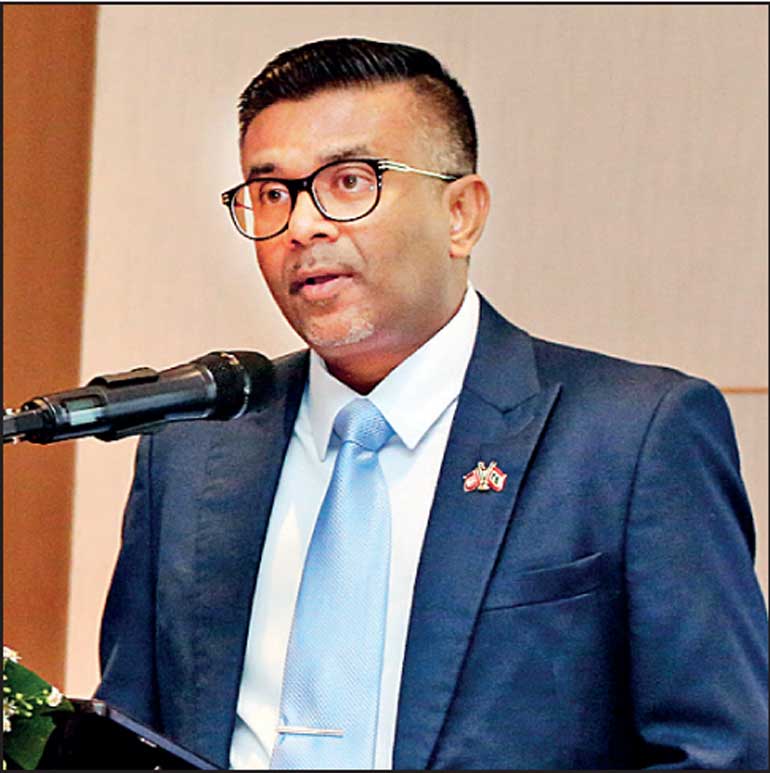Sunday Feb 22, 2026
Sunday Feb 22, 2026
Friday, 13 September 2024 00:08 - - {{hitsCtrl.values.hits}}

Seated from left: Sri Lanka-Maldives Business Council Immediate past President Kevin Edwards, Vice President Sanjeeva Perera, High Commissioner of the Republic of Maldives Masood Imad, Sri Lanka-Maldives Business Council President Sudesh Mendis, The Ceylon Chamber of Commerce Secretariat Amanthi Silva

Sri Lanka-Maldives Business Council President Sudesh Mendis
There is a growing market in the Maldives for Lankan products, particularly in the tourism, agriculture, food processing, textiles, and construction materials industries, but local exporters faced various constraints in tapping into this, a trade body has said.
The two Indian Ocean island nations are heavily reliant on tourism and foreign exchange earnings.
“We all recognise that Sri Lanka needs foreign exchange, but the current situation feels like squeezing a patient’s neck and asking them to breathe,” Sri Lanka-Maldives Business Council President Sudesh Mendis said.
“Last year market share in Maldives in imports has slightly increased to 4.6%. But achieving less than a 6% market share is disappointing. 8 years ago, we held approximately 7.02% market share. While our export revenue has grown, it has not kept pace with overall market growth, resulting in decline in our market share,” Mendis said addressing the 16th annual general meeting of the Council at Courtyard by Marriott, Colombo recently.
“Inflation, high taxes, stringent customs regulations, import duties on raw materials, strict regulations on re-export items, exchange rate fluctuations, and big gap between bank buying and selling rates, unethical business practice, immigration restrictions are some of the reasons why we are losing our export market,” Mendis said.
A delegation from the Council had visited seven Ministries in the Maldives: Maldives Port Ltd., Economic Development Ministry, Tourism Ministry, Agriculture Ministry, Transport and Civil Aviation Ministry, Male Mayor’s Office, Cities and Public Works Ministry, and Maldives Chamber.
“During our visit to the Maldives, we noticed there are significant opportunities in the Maldives. The Maldivians welcome us warmly, treating us like family, senior and junior Ministers participated in all the meetings. “They refer to Sri Lanka as their second home. Unfortunately, we have allowed these opportunities to slip into the hands of other countries.”
“In 2018 there was 17,000 Maldivians living in Sri Lanka, now we have only 1,800.”
“We discussed various issues and explored opportunities in the Maldives. They assured us of their cooperation and requested our support in strengthening bilateral relationships between our two countries.”
The export of fruits and vegetables had seen a reduction due to high prices in Sri Lanka, he said. “During our discussions with the Tourism Ministry and Maldives Port Ltd., they requested us to establish a cruise service with cargo facilities to enhance joint tourism and reduce the cost of fruits and vegetables.”
“To capitalise on these opportunities, I urge Sri Lankan businesses to focus on quality assurance, market research, and efficient logistics,” High Commissioner of Maldives to Sri Lanka Masood Imad, who delivered the keynote address at the Council’s AGM, said.
He added he was confident in the potential of the Maldives-Sri Lanka partnership and called for concerted efforts to unlock its full potential through the creation of a conducive business environment to foster growth and prosperity for both nations.
The Council had met with Governor of the Maldives Monetary Authority Ali Hashim to discuss financial matters and new regulations affecting both countries, and Maldivian Foreign Affairs Minister Moosa Zameer to discuss issues faced by Lankan exporters and businessmen in Maldives, Mendis said.
High Commissioner Imad encouraged Lankan investors to explore partnerships with Maldivian counterparts to develop high-end resorts, boutique hotels, and sustainable tourism projects.
The two nations have historical ties and shared values, he pointed out, which provided a foundation for strengthening economic partnership, with investment prospects in Maldivian tourism, hospitality, renewable energy, and fisheries sectors.
The High Commissioner proposed joint marketing campaigns, integrated travel packages, and cultural exchanges to enhance the appeal of both countries as tourist destinations.
Strengthening bilateral relations through regular business forums, trade missions, and collaborative research initiatives, was important, he said.
Several collaborative events are planned during the coming year, Mendis said. The council had organised an exhibition together with the Export Development Board, which saw strong SME participation. “We were able to introduce many innovative products to the Maldives through this exhibition.”
“Next year we are planning to do another exhibition to promote our education institutes.”